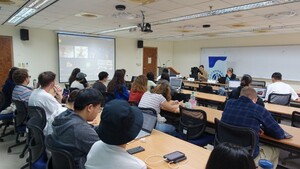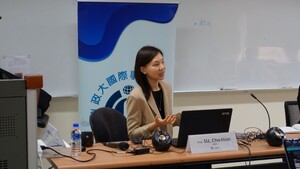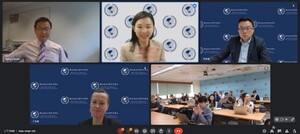The Programme of European Union Studies and Singapore Management University Co-Host Webinar on "EU's Indo-Pacific Strategy and the Cross-Strait Relations"



Date :
2023-05-31
Department :
俄研所
【Article by College of International Affairs】
The Programme of European Union Studies and Singapore Management University joined once again on March 23rd to organize a webinar centering around the topic of “EU’s Indo-Pacific Strategy and the Cross-Strait Relations”. This event, moderated by Dr. Su, Cho-Hsin, Director of the Programme, featured Dr. Wu, Chong-Han from the Department of Diplomacy, Professor Zsuzsa Anna Ferenczy from Vrije Universiteit Brussel, and Dr. Pasha L. Hsieh from Singapore Management University’s College of Law. The panel discussed the escalating rivalry between the United States and China, as well as the potential role EU could take in the Cross Strait Relations and the Indo-Pacific region.
Dr. Wu, Chong-Han began by applying theories and levels analysis to provide a more accurate and cautious assessment of the US-China competition and its impact on Cross Strait relations. At the international level, factors such as, the visit of Nancy Pelosi, the Chinese balloon incident, and the deteriorating US-China relations, all of which made a significant impact on Cross Strait relations. Dr. Wu also underscored the influence of how differing ideologies, territorial disputes concerning Taiwan and the South China Sea, and the power competition between the United States and China, shaped the competitive landscape between these two global powers.
On a national level, strategic ambiguity has been the main principle adopted by the United States and other countries in addressing Cross Strait issues. However, since President Biden took office, a shift has been observed with a clearer stance in the form of strengthened US-Taiwan relation and an increase in arms sales to Taiwan.
The discourse surrounding Cross-Strait development in Taiwan is characterized by diverse yet conflicting opinions, adding further complexity to the debate. Balancing and bandwagoning strategies are no longer practical for ensuring the sovereignty and security of the Republic of China. Dr. Wu proposed that Taiwan should place more emphasis on the benefits derived from deterring threats and serving as a model of democracy.
Dr. Zsuzsa Ferenczy later provided insights from a European perspective on EU’s Indo-Pacific Strategy. Since the release of EU Indo-Pacific Strategy, there has been a growing influence and enhanced collaboration between the EU and Asian countries. At the same time, EU maintains its One-China policy when it comes to Cross Strait issues, but also stressing the importance of preserving the status-quo, upholding democratic values and ensuring regional stability. “De-risking, not decoupling” has also been the agreed-upon direction for future Indo-Pacific strategy following the G7 Summit. In this regard, EU, France and Germany have been revitalizing their relations with China.
European countries have started to recognize the importance of strategic autonomy in their foreign policies, and coming to realize that diversifying their partnerships is in their best interests. Rather than aligning with one side or the other, EU should display greater flexibility and inclusivity when navigating the complexities of US-China competition and Cross Strait issues. While maintaining cooperation with China on global governance and sustainability, it is equally essential to collaborate with like-minded partners who share the same economic and political values to counteract China's potential threat to regional stability. Realizing Taiwan’s heightened geostrategic significance, Dr. Ferenczy argued that the European Union could engage in coordinated dialogues and cooperation with Taiwan through “minilaterals”, while still enhancing deterrence towards China simultaneously.
To conclude, Dr. Pasha L. Hsieh offered a more pragmatic point of view by sharing the current state in Singapore and ASEAN countries on their respective attitudes and strategies towards US, China and Taiwan, as well as their individual investment agreements with the European Union, offering valuable insights to the session.
The Programme of European Union Studies and Singapore Management University joined once again on March 23rd to organize a webinar centering around the topic of “EU’s Indo-Pacific Strategy and the Cross-Strait Relations”. This event, moderated by Dr. Su, Cho-Hsin, Director of the Programme, featured Dr. Wu, Chong-Han from the Department of Diplomacy, Professor Zsuzsa Anna Ferenczy from Vrije Universiteit Brussel, and Dr. Pasha L. Hsieh from Singapore Management University’s College of Law. The panel discussed the escalating rivalry between the United States and China, as well as the potential role EU could take in the Cross Strait Relations and the Indo-Pacific region.
Dr. Wu, Chong-Han began by applying theories and levels analysis to provide a more accurate and cautious assessment of the US-China competition and its impact on Cross Strait relations. At the international level, factors such as, the visit of Nancy Pelosi, the Chinese balloon incident, and the deteriorating US-China relations, all of which made a significant impact on Cross Strait relations. Dr. Wu also underscored the influence of how differing ideologies, territorial disputes concerning Taiwan and the South China Sea, and the power competition between the United States and China, shaped the competitive landscape between these two global powers.
On a national level, strategic ambiguity has been the main principle adopted by the United States and other countries in addressing Cross Strait issues. However, since President Biden took office, a shift has been observed with a clearer stance in the form of strengthened US-Taiwan relation and an increase in arms sales to Taiwan.
The discourse surrounding Cross-Strait development in Taiwan is characterized by diverse yet conflicting opinions, adding further complexity to the debate. Balancing and bandwagoning strategies are no longer practical for ensuring the sovereignty and security of the Republic of China. Dr. Wu proposed that Taiwan should place more emphasis on the benefits derived from deterring threats and serving as a model of democracy.
Dr. Zsuzsa Ferenczy later provided insights from a European perspective on EU’s Indo-Pacific Strategy. Since the release of EU Indo-Pacific Strategy, there has been a growing influence and enhanced collaboration between the EU and Asian countries. At the same time, EU maintains its One-China policy when it comes to Cross Strait issues, but also stressing the importance of preserving the status-quo, upholding democratic values and ensuring regional stability. “De-risking, not decoupling” has also been the agreed-upon direction for future Indo-Pacific strategy following the G7 Summit. In this regard, EU, France and Germany have been revitalizing their relations with China.
European countries have started to recognize the importance of strategic autonomy in their foreign policies, and coming to realize that diversifying their partnerships is in their best interests. Rather than aligning with one side or the other, EU should display greater flexibility and inclusivity when navigating the complexities of US-China competition and Cross Strait issues. While maintaining cooperation with China on global governance and sustainability, it is equally essential to collaborate with like-minded partners who share the same economic and political values to counteract China's potential threat to regional stability. Realizing Taiwan’s heightened geostrategic significance, Dr. Ferenczy argued that the European Union could engage in coordinated dialogues and cooperation with Taiwan through “minilaterals”, while still enhancing deterrence towards China simultaneously.
To conclude, Dr. Pasha L. Hsieh offered a more pragmatic point of view by sharing the current state in Singapore and ASEAN countries on their respective attitudes and strategies towards US, China and Taiwan, as well as their individual investment agreements with the European Union, offering valuable insights to the session.
